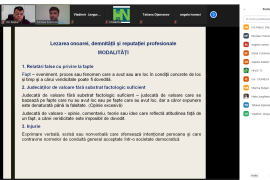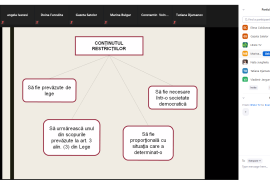back
Properly Reported Facts Protect Journalists in Alleged Defamation Lawsuits

Zoom.us capture
National and international law allows journalists to fully exercise their right to free expression. However, many regional journalists are reluctant to publish critical materials against public officials and state institutions, and this reluctance is based on previous cases when media representatives were sued for critical materials and investigative reports. During the online workshop “Freedom of Expression vs. Respect for Honor, Dignity and Professional Reputation,” Lawyer Nicolae Frumosu offered journalists several recommendations to avoid potential legal consequences. The training, which took place on 14 May, was attended by employees of the beneficiary newsrooms of the Consulting and Assistance Center for Regional Independent Media Outlets.
At the beginning of the training, the lawyer reviewed the national and international legal provisions that cover media and freedom of expression. He noted that although freedom of expression is not an absolute right, but a relative one, because there are certain limits, this right still gives journalists enough opportunities to exercise their professional duties in conditions of legal certainty, including criticizing public figures for their actions or inactions. “National legislation protects journalists in relation to civil servants and state institutions, and the Law on Freedom of Expression allows a certain degree of exaggeration or even provocation on the part of journalists towards public figures. If the journalist does not distort the facts, then it cannot be defamation. Let's say the journalist reported about a theft of public money by an official. He does not dispute the theft but claims that the amount was incorrectly indicated. In another case, the journalist reported that an official failed to declare five assets, while in reality there were only four. In such situations, even if there are certain inaccuracies, exaggerations, etc., we cannot talk about damage of honor, dignity and professional reputation,” Nicolae Frumosu specified. He added that politicians and officials must show a greater degree of tolerance for the information made public by the media, and that journalists should also publish verified information without distorting the facts.
During the workshop, the lawyer referred extensively to other topics and situations, which are frequently encountered by journalists and media outlets: the conditions for observing the presumption of innocence, censorship imposed by some employers and solutions for journalists, granting the right of reply, protection of sources and others. In the second part of the training, he spoke about the judicial aspects of the procedure for defending honor, dignity and professional reputation.
Media directors and editors had the opportunity to ask questions, request advice and express their views on the topics covered. Director of Radio Orhei Tatiana Djamanov said, “Journalists do not have enough legal knowledge, hence the difficulties they face when making some materials. You want to expose the iniquities committed by the authorities, on the one hand, and there is a fear that you will be accused of defamation, on the other hand. Nicolae helped us better understand where freedom of expression ends and defamation begins. An interesting fact that we were reminded of is that the right of reply is offered only in a few cases: if the published information is challenged and the reply is formulated in decent terms and does not contain irrelevant threats or comments. In our daily work, and especially during election campaigns, we are bombarded with requests to offer the right of reply, which we often did, but we understood in today's workshop that that was not needed in many situations.” Editor of Gazeta de Sud (Cimișlia) Ion Ciumeica referred to the fears of regional journalists when writing critical materials: "Every time, there is a kind of internal discomfort, we think we could be accused of distorting the truth. I believe that not knowing the legislation and the legal aspects does not allow us to be more demanding. The latest defamation lawsuit in which our newsroom was involved pointed out our weaknesses and what we had to do to avoid such situations. The training is very useful and necessary, and it is important for us to put into practice the knowledge gained.”
Full online workshop recording is available HERE.
Between August 2020 and April 2021, other 14 thematic webinars were held at the Consulting and Assistance Center for media staff. In May 2021, the services of the Center’s consultants benefited a total of 46 staff from 21 newsrooms, and in the past ten months – 525 media professionals.
The Consulting and Assistance Center will operate until July 2021, and newsrooms can use the consultant services whenever needed, by accessing the application on the website www.Api.md.
The project ”Program of Assistance for Independent Regional Media Outlets” is implemented by the Association of Independent Press Association (API) and funded by the US Embassy in the Republic of Moldova. The opinions expressed within the project belong to the authors of the project and do not necessarily correspond to those of the US Embassy.

